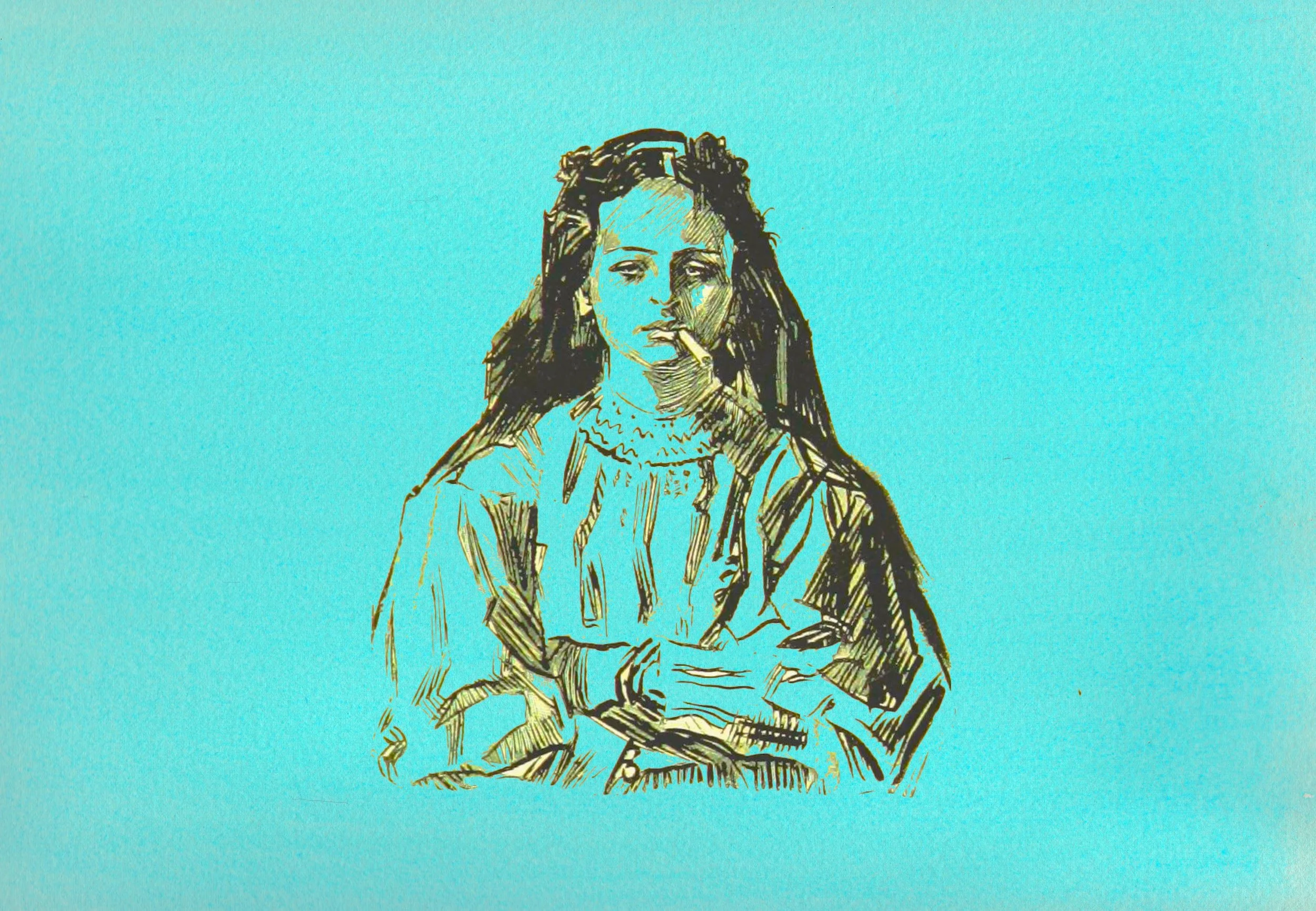RAMO AND SALIHA
TRANSLATED FROM BOSNIAN BY DENIS FERHATOVIĆ
-
Zagleda se Ramo i Saliha
Na planini ovce čuvajući.
Gledaše se tri godine dana.
Kad nastala četvrta godina,
Otposlaše Ramu na planinu,
A Salihu svatovim dadoše.
To začuo na planini Ramo,
Te on siđe na drum prid svatove,
Pod Salihom konja ufatio:
„Stan, Saliha, da se hesābīmo!“
„Šta ćemo se, Ramo hesábiti?
Dao si mi gaća trista akči,
Dva učkura, svaki po krk akče,
I to, Ramo, uć juz seksen akče.
Dao si mi svile sèksen akče,
I to, Ramo, dort juz altmiš akče.
Dao si mi halve altmiš akče,
I to, Ramo, beš juz jirmi akče.
Dao si mi jȁga altmiš akče,
I to, Ramo, beš juz seksen akče.
Dao si mi hrmze jìrmi akče,
I to, Ramo, šest stotina ravno.
Ako si mi gaće kupovao,
Na svom si ih vratu ti derao;
Ako si mi ùčkur kupovao,
Svojim si ih zubima trgao;
Ako si mi svilu kupovao,
Vezene si jàgluke derao;
Ako si mi halvu kupovao,
Sa mnom si je naporedo jeo;
Ako si mi hrmzu kupovao,
Ljepša ti je hȁjkavica bila.“
Pušća Ramo konja pod Salihom,
Svatovima je plaho govorio:
„Vodte, svati, jebena Salihu!“
-
by Denis Ferhatović
I was in the stacks of my first college library, two decades ago, leafing through an anthology of texts written in alhamiado, which in the Balkans means Arabic script adapted for the central South Slavic vernacular, when I chanced upon this delightful poem. (In the Iberian context, aljamiado refers to Romance linguistic varieties written in Arabic letters.) “Saliha and Ramo” stood apart from the surroundings which, with a few other exceptions, mostly contained stultifying religious and historical writing, such as sermons in verse against tobacco or for wifely obedience, and pathetic petitions to the authorities for support from the edges of the Empire. “Ramo and Saliha” features the voice of a defiant woman in a rural setting, a shepherdess, who tells her ex-lover that she owes him nothing.
The poem, composed in a familiar South Slavic folk vein, is found with Mullah Mustafa Başeski’s lively Chronicle (Mecmua [lit., Compilation]) covering the years of 1746-7 to 1804-5 (AH 1159-1219). We know nothing about the author of “Ramo and Saliha.” Mehmed Mujezinović, Başeski’s translator into Bosnian, argues that the chronicler merely copied it. In any case, the poet probably did not belong to the rank of the characters who must have been illiterate. This might be a fantasy of rough, fabric-shredding shephard sex by a member of an urban, educated class like Başeski. At the same time, the picture of Saliha in the poem indicates what was plausible in eighteenth-century Ottoman Bosnia. She is an outspoken woman of humble background who enjoys fancy commodities like sweetmeats, clothes, and cosmetics. Moreover, knowing their precise monetary value, she can add up Ramo’s relationship-related expenses switching between her vernacular and Turkish. I left the Turkish untranslated to keep much of the bilingual texture of the poem. Here is the code: 300 + 40 x 2 = 380; + 80 = 460; + 60 = 520; + 60 = 580; + 20 = 600.
I should add some words of explanation about a piece of realia and Saliha’s reference to her genitals. Rusma refers to a depilatory paste consisting of orpiment and slaked lime. Orpiment, from auripigment, is a sulfide of arsenic, a toxic, bright yellow, orange, or red substance. It was used in depilatories in the United States into the nineteenth and early twentieth centuries. Rusma and hrmza (both meaning a type of depilatory paste) are cognates, in English and Bosnian from Ottoman Turkish and in there perhaps from Greek (the same word that becomes chrism). Saliha’s hajkavica was harder to render. I did not want to make the character sound like Chaucer’s Alisoun of Bath who uses multiple vulvar expressions (queynte, bele chose, quoniam), although I do see a certain resemblance between them. The option I settled on and still a striking word in American English, cunt, has a long history. It has been reclaimed by feminists. It appears as con in the French fabliaux, a genre – like Saliha – very aware of material value of objects, food, and sex.
Denis Ferhatović (b. 1980) is a Bosnian-American scholar and writer, working and playing with English, French, Turkish, Indonesian, South Slavic microlanguages, and medieval Germanic and Romance languages. His essays, poems, translations, and co-translations have been published in Rumba under Fire, Index on Censorship, The Riddle Ages, and Iberian Connections. His scholarly work appears in various journals and essay collections. His monograph Borrowed Objects and the Art of Poetry: Spolia in Old English Verse came out in 2019.
Ramo and Saliha first saw each other
While tending sheep in the mountains.
They courted for three long years.
When the fourth year came,
Ramo was sent away to the mountains
And Saliha betrothed to another.
The news traveled to Ramo in the mountains,
and he came down to face the wedding party.
He grabbed Saliha’s horse by the reins:
“Stop, Saliha, let’s settle up!”
“What is there to settle, Ramo?
You gave me pants, worth three hundred akçe.
Two waistbands, kırk akçe each.
So that, Ramo, is üç yüz seksen akçe.
You gave me silk, seksen akçe.
So that, Ramo, is dört yüz altmış akçe.
You gave me halva, worth altmış akçe.
So that, Ramo, is beş yüz yirmi akçe.
You gave me rose water, altmış akçe.
So that, Ramo, is beş yüz seksen akçe.
You gave me rusma, yirmi akçe.
So that, Ramo, is six hundred flat.
If you bought me pants,
You ripped them round your neck.
If you bought me waistbands,
You tore them with your teeth.
If you bought me silk,
You ripped the kerchiefs I embroidered.
If you bought me halva,
You had some with me.
If you bought me rusma,
My cunt was all the prettier for you.”
Ramo let go of Saliha’s horse.
Bitterly he spoke to the party:
“Take that fucking Saliha away!”

